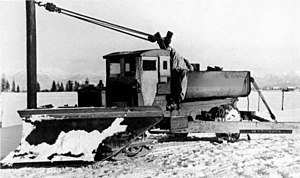truck routes was to demonstrate that it was possible to keep long stretches of highway open to traffic through a severe winter and that dependable long-distance interstate travel on the highways was desirable and even necessary.

Snowplows played an important role in keeping the military truck routes open.

Trucks were steadily being built for war duty, but highway officials were hard pressed to get funds or materials to maintain the roads damaged by the trucks.
The Highway Departments Call for a National War Policy for Roads
When the annual meeting of the American Association of State Highway Officials (AASHO) opened at Richmond, Virginia, December 4, 1917, the problem uppermost in the minds of the delegates was how to carry on and keep the roads open in the face of what many of them perceived to be a hostile policy by the Government toward highway transportation. Priority Order No. 2 was only the latest action hampering their efforts. The War Industries Board had assumed control over all supplies of cement, brick, steel, stone, and gravel and was giving the highest priorities for these materials to defense installations and the railroads. The Fuel Administration controlled the supply of fuel oil, and to make more fuel available, it restricted the production of asphalt. No bond issues exceeding $100,000 could be made without the assent of the Capital Issues Committee, a war organization that was particularly hostile to highways. Clearing a project through these war agencies was a matter of weeks and even months since there was very little cooperation between them.
To make things easier for the Government, AASHO called upon all the States to designate the essential war roads and estimate the amounts of materials and rail transportation that would be needed for their construction and maintenance during the coming year. These programs would then clear through the Executive Committee of AASHO and in due course be presented to the Priority Board and to the Highway Transport Committee of the National Council, of which Director Page of the OPRRE was a member.[1]
The delegates also passed a resolution,
. . . That the American Association of State Highway Officials request the United States Government to formulate and promulgate, as soon as possible, a definite policy for road and street construction and maintenance, and that it is requested that said policy contain a statement that freight cars shall be furnished next spring for the transportation of the necessary materials for the construction and maintenance of streets and roads of economic or military value.[2]
There was a note of urgency in this resolution, for the State officials knew that the spring breakup was
96
